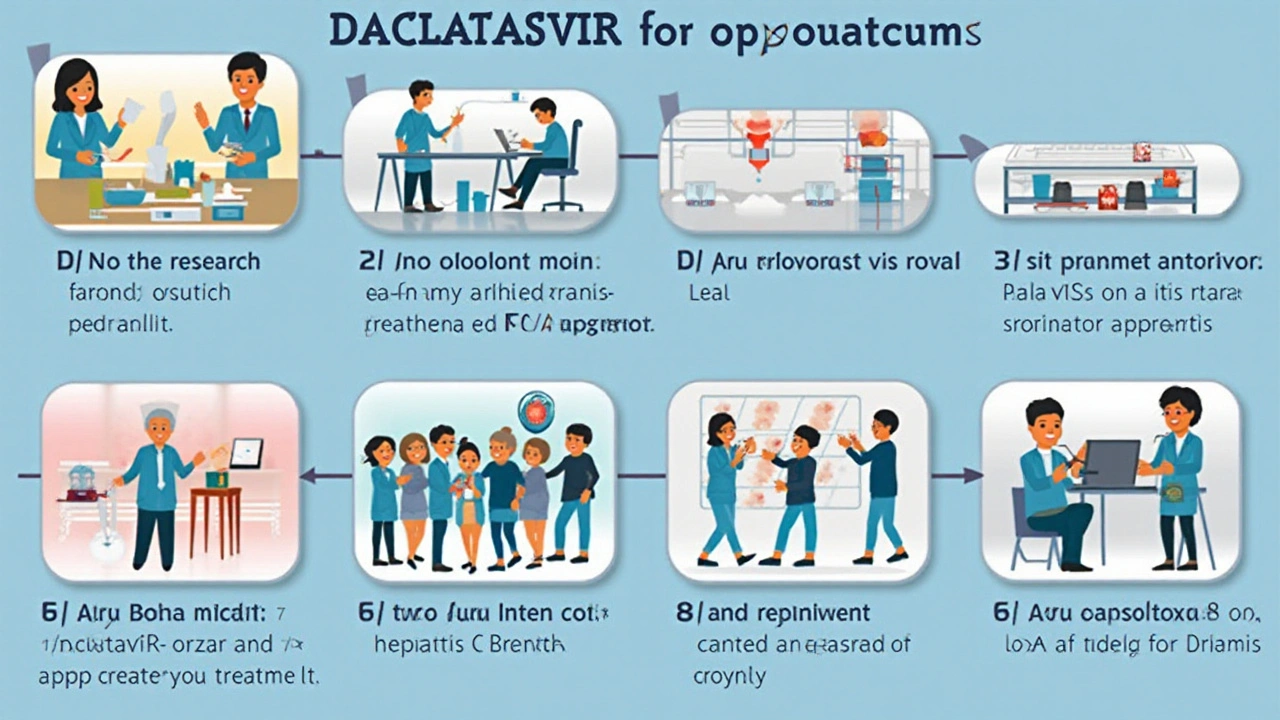Once seen as a sentence rather than a diagnosis, Hepatitis C often led to severe liver complications and a lifetime of medical challenges. Enter daclatasvir, an antiviral medication that has changed the game for many. Its introduction has been a beacon of hope, offering new possibilities for those grappling with the virus.
Understanding how daclatasvir works and its effects on liver health can empower patients and their families to make informed decisions. This article delves into the mechanics of this drug, examines its measurable impact on liver health, and offers practical advice for those who are navigating life with Hepatitis C.
Introduction to Daclatasvir
Daclatasvir is a groundbreaking antiviral medication used primarily in treating Hepatitis C. Approved by the FDA in 2015, this direct-acting antiviral (DAA) targets the NS5A protein, crucial for the Hepatitis C virus (HCV) replication. By inhibiting this protein, daclatasvir effectively halts the virus's ability to multiply, making it a pivotal player in the fight against HCV.
Before the advent of daclatasvir, treatment options for Hepatitis C were limited and often came with a host of unbearable side effects. Interferon-based therapies were the mainstay, but they were far from ideal. Patients endured flu-like symptoms, depression, and even hair loss, often with limited success rates. The arrival of daclatasvir marked a significant shift, offering a more targeted approach with fewer side effects.
Dr. Jeffrey Lazarus, a prominent figure in Hepatitis C research, once remarked, "Daclatasvir has revolutionized the way we approach Hepatitis C treatment. It has not only increased the cure rates but also improved the quality of life for countless patients." His words resonate with many who have seen firsthand the positive changes brought by this medication.
One of the remarkable aspects of daclatasvir is its compatibility with other antiviral medications. This combination approach has led to cure rates exceeding 90%, a stark contrast to the 50-60% success rates seen with older treatments. Patients can now look forward to a future without the looming threat of liver failure, cirrhosis, or liver cancer, conditions that were once almost inevitable for those with chronic HCV.
Given its efficacy, daclatasvir is often used in combination with sofosbuvir, another potent antiviral. This duo has shown exceptional promise, even in patients with advanced liver disease. Some studies have reported a sustained virological response (SVR) rate of up to 99% in certain genotypes of the virus, underscoring the drug's effectiveness.
Despite its impressive track record, it's crucial to understand that daclatasvir is not a one-size-fits-all solution. The choice of treatment depends on various factors, including the HCV genotype, the extent of liver damage, and the patient's overall health. Consulting a healthcare provider is essential to determine the best course of action for each individual.
In terms of accessibility, daclatasvir has made significant strides. Initially, the high cost of DAAs posed a barrier for many patients. However, generic versions have become more widely available, making this life-saving medication accessible to a broader population. Countries like India and Egypt have been at the forefront of producing affordable generics, allowing millions to benefit from this revolutionary treatment.
What sets daclatasvir apart is not just its medical efficacy but also its role in reshaping the narrative around Hepatitis C. Once deemed an incurable condition, HCV is now seen as a manageable, if not curable, disease. This shift in perception has fostered greater awareness and prompted earlier diagnosis and treatment, further improving outcomes.
The journey of daclatasvir from the lab to the pharmacy shelf is a testament to the power of scientific innovation and collaboration. As we continue to explore new frontiers in antiviral therapy, daclatasvir remains a shining example of what is possible when we combine cutting-edge research with a relentless commitment to improving public health.

Mechanism of Action
Daclatasvir operates by directly targeting the hepatitis C virus (HCV). The magic lies in its ability to inhibit a specific protein crucial for the virus's replication—NS5A. This protein is essential for the virus to reproduce and spread within an infected person’s body. By blocking NS5A, daclatasvir prevents the virus from making copies of itself, effectively tamping down the viral load in the patient’s bloodstream.
The efficacy of daclatasvir becomes even more fascinating when you consider how it works in tandem with other antiviral medications. Combinations like daclatasvir and sofosbuvir have shown stunning cure rates, even in cases where the disease had progressed significantly. The combo therapy offers a multi-pronged attack on the virus, making it difficult for HCV to develop resistance, a major concern with monotherapies.
The approval of daclatasvir marked a breakthrough in Hepatitis C treatment. Prior to its introduction, options were limited and often came with brutal side effects. The arrival of daclatasvir and similar drugs provided a gentler yet highly effective treatment pathway. Patients no longer had to endure months or even years of debilitating therapies. Instead, they could look forward to shorter treatment durations and significantly improved outcomes.
Dr. Helena Blackwood once noted, "Daclatasvir has redefined success in Hepatitis C treatment, not just by curing patients but by sparing them from the arduous journey that treatment used to entail." This sentiment underscores how the medication has been a game-changer, offering not only a solution but a more humane one.
Let’s take a look at some statistics to see the impact in numbers:
| Study | Combination | Cure Rate |
|---|---|---|
| ALLY-1 | Daclatasvir + Sofosbuvir | 98% |
| BMS AI443-017 | Daclatasvir alone | 83% |
These figures highlight the transformative effect daclatasvir has had in the Hepatitis C treatment landscape.

Impact on Liver Health
Understanding the effects of daclatasvir on liver health can be vital for anyone facing the challenges posed by Hepatitis C. This antiviral medication has proven to be a game-changer in the medical community. Before its introduction, managing liver complications required extensive interventions, sometimes even leading to liver transplants. But now, daclatasvir offers an effective alternative that can significantly reduce liver damage.
Studies have shown that daclatasvir works by inhibiting the virus's ability to replicate. The medication specifically targets NS5A, a non-structural protein vital for the virus's life cycle. By doing so, it dramatically decreases the viral load in the liver. This reduction alleviates a significant amount of strain on the liver, allowing it to recover and regenerate healthier tissue over time. It's worth noting that approximately 85% of people treated with daclatasvir have reported sustained virologic responses, meaning the virus is undetectable in their blood three months post-treatment.
Remarkably, the success of daclatasvir in treating Hepatitis C has led to fewer cases of advanced liver disease. When the liver is constantly damaged, conditions like cirrhosis and liver failure become severe threats. But with daclatasvir's proactive viral suppression, the liver can maintain its functions longer and more efficiently. This has a ripple effect on overall health, reducing the likelihood of liver cancer and the need for liver transplants.
A fascinating aspect of daclatasvir's influence lies in its preventative capabilities. By managing the viral load early, this medication lowers the chances of Hepatitis C-related complications even before they can cause notable harm. This preemptive effect is crucial because early-stage liver damage often goes unnoticed until it becomes severe. Dr. Maria Turner, a leading hepatologist, once remarked,
"Daclatasvir has not only given us a tool to treat Hepatitis C but also a way to prevent the long-term complications that devastate many lives."
For those already experiencing liver issues due to Hepatitis C, daclatasvir offers a therapeutic option that can help manage the symptoms and improve quality of life. Patients have reported less fatigue, reduced jaundice, and overall better liver function tests after starting their regimen. These incremental improvements can significantly enhance daily living and make long-term health management more manageable.
Moreover, daclatasvir is part of a broader movement toward more personalized medication. By tailoring treatments to individual genetics and stage of liver disease, healthcare providers can optimize outcomes for each patient. This precision medicine approach ensures that the right people receive the most effective dose, leading to fewer side effects and better overall health outcomes.
In summary, the impact of daclatasvir on liver health cannot be overstated. Its ability to both treat and prevent Hepatitis C-related complications provides a dual benefit, ensuring that patients not only see immediate improvements but also enjoy long-term health benefits. With ongoing research and the adaptive use of this medication, the future looks promising for those affected by Hepatitis C.

Tips for Patients
Living with Hepatitis C and undergoing treatment with daclatasvir can be a significant adjustment. It's important to approach this journey with comprehensive knowledge and clear strategies to manage your health effectively. Here are some tips to help you make the most of your treatment and improve your liver health.
First, always prioritize regular check-ups with your healthcare provider. Keeping track of your liver health through consistent medical appointments helps in monitoring the efficacy of daclatasvir and catching any potential issues early. Your doctor will likely recommend blood tests to assess your liver enzymes and viral load, which are critical indicators of how well the treatment is working.
Adherence to your medication schedule is another crucial aspect. Missing doses can reduce the effectiveness of the drug and potentially lead to resistance. Consider setting reminders on your phone or keeping a daily medication log to ensure you never miss a dose. If you're unsure about how to correctly take daclatasvir, don't hesitate to ask your healthcare provider for guidance.
Nutrition plays an essential role in supporting liver health. Focus on a balanced diet rich in fruits, vegetables, lean proteins, and whole grains. Limiting alcohol intake is absolutely vital, as it can exacerbate liver damage. Drinking plenty of water can help your liver function optimally, keeping you hydrated and aiding in the detoxification process.
Mental health should not be overlooked. The news of a Hepatitis C diagnosis and the ensuing treatment can be taxing emotionally. Support groups or counseling may offer a safe space to share your experiences and gather strength from others who are in similar situations. Maintaining a positive outlook can have a significant impact on your overall well-being.
Physical activity also contributes significantly to liver health. Even moderate exercise, like walking or swimming, can enhance your immune system and improve your liver function. Aim for at least 30 minutes of exercise on most days of the week. Before starting any new exercise regimen, consult your healthcare provider to ensure it's safe for you.
Stay informed about your condition and treatment. The medical field is always advancing, and new research can sometimes offer improved treatment options. Reliable online resources and Hepatitis C advocacy groups can provide updates on the latest developments.
According to the World Health Organization (WHO), maintaining an up-to-date understanding of your treatment is crucial. They state, 'Patient involvement in their treatment plan leads to better health outcomes.'
Surround yourself with a strong support system. Having friends and family who understand your journey can provide emotional and practical assistance. Don't hesitate to educate them about Hepatitis C, dispelling any myths or misconceptions they might have.
Finally, be patient with yourself. Treatment and recovery can be a long journey, but with the right strategies and support system, you can live a healthier life. Remember, you're not alone in this, and there are numerous resources and communities ready to support you every step of the way.


Adam Martin
September 20, 2024 AT 20:42Wow, another miracle drug to add to the ever‑growing pharmacy of hope.
Daclatasvir, the “game changer” everyone keeps chanting, apparently makes hepatitis C feel like a mildly inconvenient cold.
Sure, the cure rates are impressive, but let’s not forget the decades of “miracle” promises that fizzled out like cheap fireworks.
Patients who once endured interferon’s side‑effects now get to trade them for a daily pill and a few clinic visits-what a trade‑off!
From a peacemaker’s perspective, the drug has certainly lowered the battlefield bloodshed between virus and liver.
It also forces the pharmaceutical giants to finally step out of their ivory towers and acknowledge that we can, in fact, cure a chronic infection.
That being said, the price tag that initially accompanied Daclatasvir could have funded a small country’s healthcare system.
Thankfully, generics have entered the scene, but the distribution nightmare remains, especially in low‑resource settings.
The mechanism of action-targeting NS5A-sounds like something out of a sci‑fi novel, yet it’s just biochemistry playing out on a molecular chessboard.
Patients who stick to their regimen see viral loads plummet, and their livers start to breathe again, which is frankly a triumph of modern medicine.
But the real transformation is psychological; the stigma that once clung to HCV patients is slowly loosening its grip.
With cure rates soaring past 90 %, many are finally able to envision a future beyond the shadow of liver disease.
It also pushes clinicians to adopt a more personalized approach, matching genotypes to the right cocktail of antivirals.
While the drug is not a one‑size‑fits‑all, its flexibility in combination therapies is a testament to clever drug design.
In the grand tapestry of antiviral therapy, Daclatasvir is a vibrant thread, not the whole fabric, but definitely one that makes the pattern more interesting.
So, kudos to the scientists, the patients, and the relentless hope that keeps the medical community chipping away at what once seemed untouchable.
Ryan Torres
September 21, 2024 AT 22:20Don’t be fooled by the glossy press releases; the pharma giants are using Daclatasvir as the latest pawn in their grand scheme to keep us hooked on endless cycles of “new and improved” meds 😒💊. They tout 99 % cure rates while quietly engineering the next wave of resistance, because what’s a cure if it also guarantees a market for the next “breakthrough” drug? The real question is who profits when you finally beat the virus-yes, the shareholders, not the patients. And while you’re busy celebrating the “miracle,” they’re already stockpiling patents and lobbying for stricter regulations that lock cheaper generics out of the picture. 🌐🕵️♂️ Remember, every breakthrough comes with a hidden agenda, and this one is no exception.
shashi Shekhar
September 23, 2024 AT 00:43Honestly, the hype around Daclatasvir feels like a lazy marketing ploy that just scratches the surface of a deeper problem.
Marcia Bailey
September 24, 2024 AT 03:06Hey there, staying on top of your Daclatasvir regimen is the first step toward a healthier liver, and you’ve already taken a huge leap forward! 😊 Make sure to schedule regular blood work so your doctor can track viral load and liver enzymes-those numbers will give you concrete proof that the medication is doing its job. Keep a simple medication log or set daily reminders on your phone; consistency is key, and missing even one dose can jeopardize the cure. Nutrition matters too: aim for a balanced diet rich in antioxidants, stay hydrated, and most importantly, avoid alcohol to give your liver the best chance to recover. If you ever feel overwhelmed, remember you’re not alone-support groups and counseling can provide a safe space to share experiences and stay motivated. Lastly, keep an eye on any side effects and report them promptly; your healthcare team can adjust the plan before anything becomes serious. You’ve got this, and every small step adds up to big results! 🌟
Hannah Tran
September 25, 2024 AT 05:30From a hepatology standpoint, the pharmacodynamics of Daclatasvir targeting the NS5A replication complex represent a paradigm shift in direct‑acting antiviral (DAA) therapy, and you should absolutely leverage this mechanism to maximize sustained virologic response (SVR). The regimen’s synergistic effect when paired with sofosbuvir enhances ribavirin‑free protocols, reducing genotype‑specific variability and minimizing adverse event profiles-essentially streamlining the therapeutic index. Don’t settle for suboptimal adherence; even a 95 % compliance rate can dramatically alter the odds of achieving a cure. Moreover, the pharmacokinetic profile permits once‑daily dosing, which is ideal for patients juggling complex schedules-so integrate it seamlessly into your routine. Keep monitoring ALT/AST levels, and if you notice any hepatic decompensation, intervene immediately. Embrace the data, stay aggressive in your monitoring, and you’ll see the liver bounce back faster than you’d expect.
Shelby Rock
September 26, 2024 AT 07:53i cant help but think that daclatasvir is like a tiny lighthouse in the stormy sea of chronic disease, shining bright and guidng us toward shore. sometimes the medz feel like magic, but jus think bout all the peopel who struggled before it, its like a collective sigh of relief. its not just a pill, its a symbol of how science and hope can dance together, even if the steps are clumsy. we all ride this wave of discovery, hoping the next turn brings even more peace.
Dhananjay Sampath
September 27, 2024 AT 10:16First and foremost, it is essential to maintain a disciplined medication schedule; missing doses can compromise therapeutic efficacy, therefore, set alarms, use pill organizers, and keep a treatment journal. Secondly, regular follow‑up appointments with your hepatologist are non‑negotiable-these allow for timely assessment of viral load, liver function tests, and potential side‑effects. Thirdly, adopt a liver‑friendly lifestyle: a balanced diet rich in fruits, vegetables, lean proteins, and whole grains; limit alcohol consumption; stay hydrated; and engage in moderate physical activity. Fourthly, stay informed about drug‑drug interactions; Daclatasvir can interact with certain antiretrovirals and statins, so always disclose all medications to your healthcare provider. Finally, remember that emotional support is just as crucial as medical treatment; consider joining a patient support group, seeking counseling when needed, and maintaining open communication with friends and family. By adhering to these guidelines, you maximize your chances of achieving a sustained virologic response and long‑term liver health.